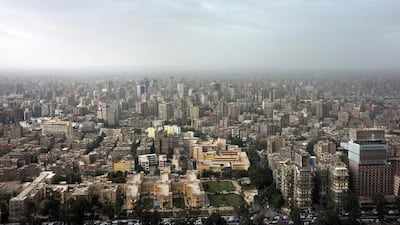The International Monetary Fund is set to unlock the fifth tranche of Egypt’s $12 billion (Dh44bn) loan package following “substantial progress” on fiscal reforms, which have propelled the country’s economic growth to among the fastest in the Middle East and North Africa.
The IMF board will meet in the coming weeks to discuss a review of Egypt’s loan programme, which commenced in late 2016, Christine Lagarde, managing director of the Washington-based lender, said in a statement on Friday. She said she would recommend the board to approve the review.
The final tranche would unlock a $2bn disbursement to the most populous Arab country.
“The Egyptian authorities embarked on an ambitious economic reform programme in 2016 that is being supported by an IMF financial arrangement,” Ms Lagarde said in the statement. “Since then, Egypt has made substantial progress as evident in the success achieved in macroeconomic stabilisation.”
Egypt’s gross domestic product is forecast to grow at 5.5 per cent this year, up from an expected 5.3 per cent rate in 2018 and 4.2 per cent in 2017, according to the IMF’s projections in October. This is one of the fastest GDP growth rates in the Mena region.
At the same time, Egypt’s budget deficit is on a downward trajectory, forecast to reach 7 per cent in 2019-20, inflation is on track to reach the Central Bank of Egypt’s target of single digits by the end of 2019 from around the current 13 per cent, and unemployment has declined to 10 per cent, which is the lowest since 2011 as social protection measures are expanded, Ms Lagarde noted.
“It is important to build on the progress achieved thus far and to press ahead with structural reforms that facilitate private sector-led growth and job creation, as well as measures to increase transparency and accountability that help improve governance. This will help attain higher inclusive growth and ensure better living standards for all Egyptians,” she said.
Egypt, North Africa’s largest economy, suffered major setbacks as a result of political turmoil stemming from the Arab Spring, with economic growth losing momentum, capital outflows increasing and inflation skyrocketing. To reverse years of decline, it is implementing economic reforms.
Under the IMF-backed overhaul, the country has made deep cuts to energy subsidies, introduced new taxes and floated its currency in bid to kick-start economic activity, boost investor confidence and restore stability to capital markets.
Egypt has introduced at least 10 pieces of legislation in the past two years, relating to investment, companies, bankruptcy and regulation of ride-hailing app Uber in the country.
Ms Lagarde said in September Egypt’s economy was showing strong signs of recovery.
Egyptian finance minister Mohammed Mait said in November the country will not ask for further funding from the IMF when the programme expires at the end of this year.

